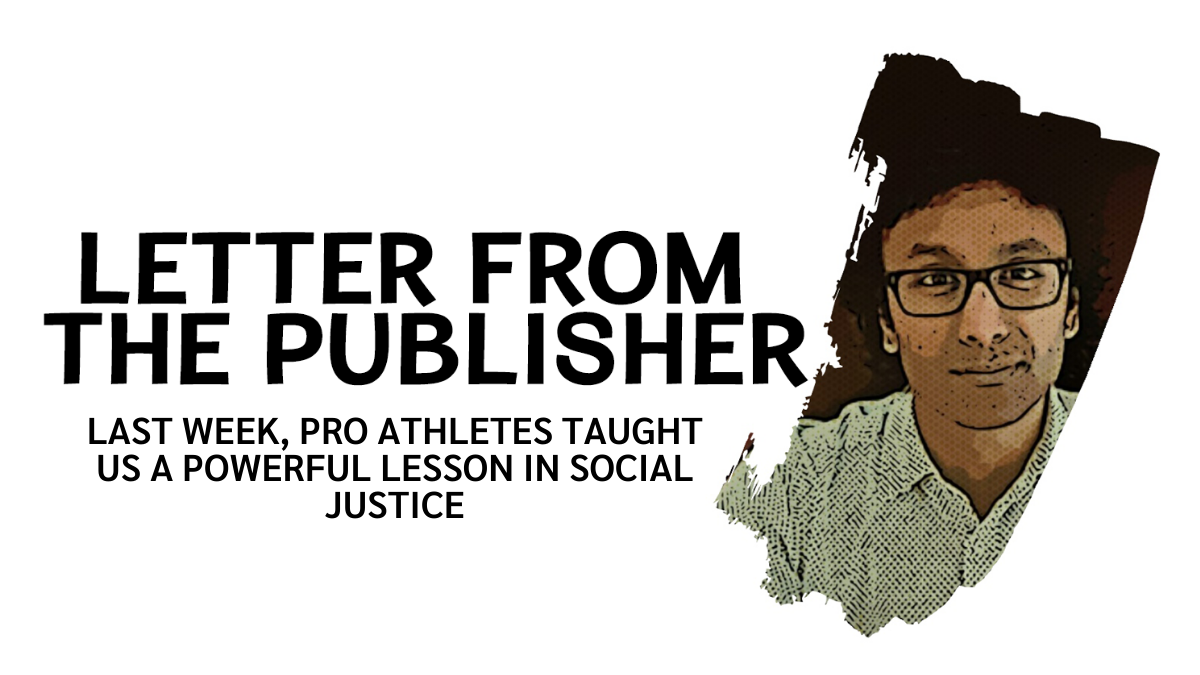Last week, pro athletes taught us a powerful lesson in social justice

Over the past week, as the airwaves filled with speeches from the Conservative Party of Canada’s leadership race and the Republican National Convention in the United States, a little-known mother stood in front of microphones to make a speech.
It was one that no speechwriter had polished, yet it was one that – in its powerful simplicity, devastating calm, and searing call for peace – shook those who heard it.
Julia Jackson is the mother of Jacob Blake, who was shot in the back several times on August 23rd by police officers in Kenosha, Wisconsin. The 29-year-old Black man lies in hospital, his spinal cord shattered. But there stood Ms Jackson, in front of the media, and the words just flowed. “You can see that I have beautiful brown skin but take a look at your hand and whatever shade it is, it is beautiful as well,” she said. “God did not make one type of tree or flower or fish or horse or grass or rock. How dare you ask him to make one type of human who looks just like you.” There was pain, but it was a message for everyone to “take a moment and examine your hearts.”
At the same time, on the other side of the world, we heard another mother’s speech during testimonies given last week in Christchurch, New Zealand, at the trial of Brenton Tarrant, who killed 51 people in the deadly mosque shooting of 2019. This speech was given by Janna Ezat, whose son was murdered. “I decided to forgive you, Mr Tarrant,” she told him. “Because I don’t have hate, I don’t have revenge.”
I find it extraordinary how many mothers, faced with such awful moments, show an unnerving refusal to be cowed by the urge for anger.
Anger, no. But action, yes.
Last week marked an unprecedented moment in North American sports, something fans will remember for years to come.
In Orlando, Florida, the NBA’s Milwaukee Bucks didn’t take the floor for their playoff game against the Magic. The Bucks’ move resonated around the sports world. The NBA later announced it would postpone all games scheduled for last Wednesday. Major League Baseball called off its games. The WNBA postponed all three games on the league’s schedule. The NHL postponed the remaining weekday games last week after taking criticism for playing as other leagues shut down.
Players across leagues chose to boycott in their strongest statement yet against racism and racial violence — and for the most part, general managers, team owners and referees were with them.
Boycotting can be a powerful tool to catalyze action in the causes you deeply care about.
My great grandmother in India used to tell me stories about the movements she and my great grandfather were a part of where they boycotted buying British goods. She used to say, in Telugu, loosely translated: “withdrawing from something is a powerful expression of protest.”
And that’s exactly what happened in the sports industry last week. Players used their positions of privilege and influence to make a bold statement, and hopefully, spark meaningful change.
It led me to think about the societal inequities exposed and amplified by COVID-19 — and the inequities within our social impact world. And it led me to think about, again, as the professional athletes inspired, how social impact professionals could use their privilege to make moves that drive change.
In recent years, there have been worthwhile examples of immediate, public, and powerful acts of change — from men boycotting speaking on all-male panels to executives acknowledging the traditional territory where their offices are located and the historic injustices towards Indigenous peoples. Professional athletes across North America compel us to keep going.
After years of talk — about board diversity, digital transformation, systemic racism, worker pay, youth inclusion, reconciliation, and holding ourselves to higher professional and societal standards — the time has come, yet again, to take action. And that begins with each of us.
We have had enough mothers in the past week demand fundamental shifts in our society. It’s up to you to make the next move.
As the sporting metaphor goes, the ball is in your court. What will you do?
Vinod Rajasekaran
Publisher & CEO
